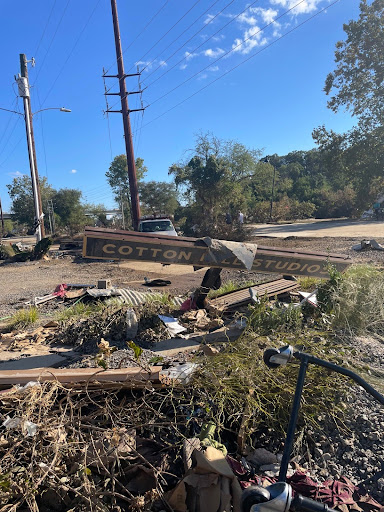In the wake of a second Trump election, pandemonium struck in my university’s city.
Tucked away in the foothills of Appalachia, known for its progressive and inviting culture, Asheville, North Carolina, its River Arts and Industrial Districts, along with surrounding towns by the French Broad and Swannanoa rivers, were devastated on Sept. 28.
Dozens lost their lives, and millions of dollars in damage was inflicted on an already struggling community.
Being a registered Democrat, I am saddened by the lack of empathy of my fellow party members. Why don’t they look down from atop the hill?
The Buddha spoke of leaving his kingdom for the first time, witnessing the poverty surrounding it and then abandoning his royal lifestyle to live simply. I’m not suggesting these individuals must forfeit their wealth to the masses. I grew up with plenty myself.

Unless you’ve experienced financial hardship or immersed yourself in a struggling community, it isn’t easy to fully understand what the common man endures.
Over the summer, I worked nearly every day on second and third shifts as a gas station clerk in inner-city Charlotte, North Carolina. The areas I worked in have some of the highest crime rates in the state.
Working at a corner store, I encountered people from all walks of life, from blue-collar workers coming in the early morning for coffee to third-shift workers at 7 p.m., dragging themselves to low-paying jobs.
Seldom were these individuals white. When I moved to Asheville, I was struck by how predominantly white the town was. Charlotte, by contrast, was incredibly diverse in political perspective and race.
In Asheville, the focus remains overwhelmingly on issues like LGBTQ+ culture, election anxieties and U.S. involvement in foreign conflicts like those in Gaza and Ukraine. Many people I’ve encountered here in Asheville seem to have their priorities flipped, opting to prioritize foreign affairs and overseas conflicts over their neighbors impacted by the hurricane.
The residents of North Carolina are living paycheck to paycheck, repairing their homes from hurricane damage and struggling to find nutritious food for their families. Yet the people around me seem unable to understand why Trump won.
They are so far removed from the daily economic struggles of average citizens, even those in the neighborhoods just down the hill. They fail to realize America’s progress is still incomplete.
Liberalism often stems from a place of abundance.
If Democrats want to engage low-income individuals, progressive ideals must be grounded in reality and benefit the common man.
A rising tide lifts all ships.
Change has to start in our backyard. The Democratic Party must abandon hyper-progressive ideals the everyday person can’t relate to.
This is your voter base, Democrats, immerse yourselves in their communities and offer a helping hand. These are not noble savages who are perpetual victims of circumstance. They are hardworking Americans striving to provide for their children, neither better nor worse than the wealthy residents of large coastal cities.
Liberalism stems from a place of abundance. Financial hardship breeds conservatism.
So, Democrats, the next time you ask why the GOP would endorse Trump as their candidate, look down from atop the hill, immerse yourself in your neighbors’ community and you will see it is because the common man is struggling.


![Brooke Pedersen [second from the right] and Luis Reyes [right] hold banners during the Wrap The Woods event.](https://thebluebanner.net/wp-content/uploads/2025/09/ELIZABETH_PRITCHITT_IMG_3470-1200x804.jpg)
















